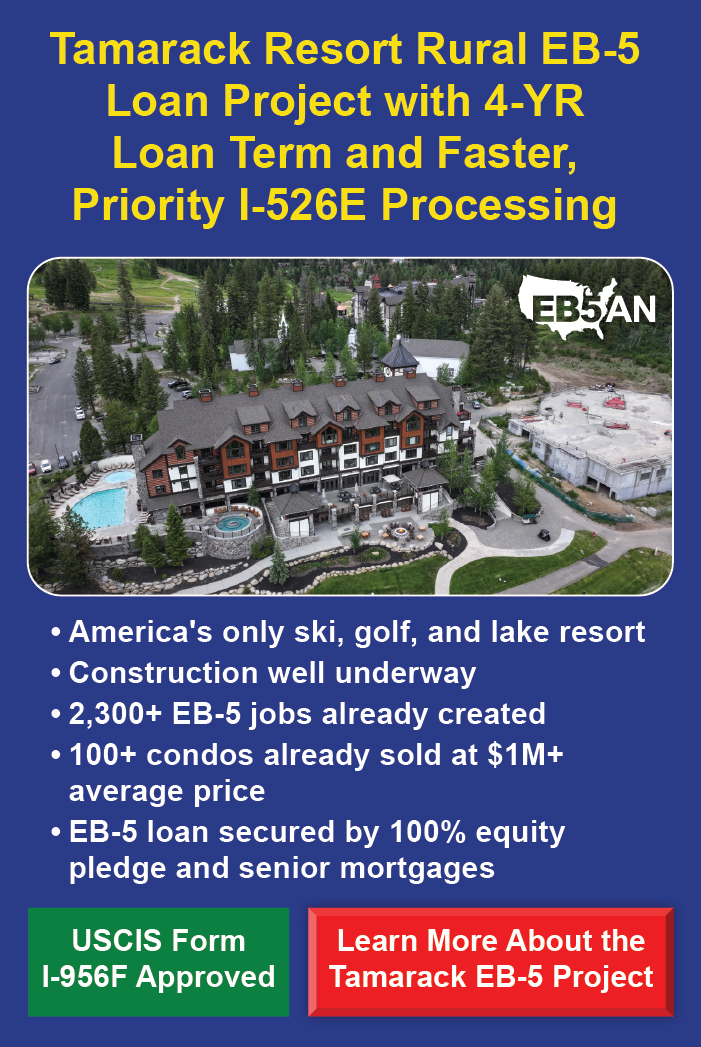In a major turn of events, United States Citizenship and Immigration Services (USCIS) and Department of Homeland Security (DHS) have settled with Invest in the USA (IIUSA) and several EB-5 Regional Centers.
In this settlement, USCIS has rescinded its attempted deauthorization of previously approved regional centers.
Register for our Webinar on August 25 at 3 PM EDT with Top EB-5 Attorney Ron Klasko to Analyze the Terms of the Settlement Agreement and the path forward for EB-5 regional centers and investors. After the webinar occurs, this link will access a video recording of the webinar.
Form I-956 Must Be Filed as an Amendment to Maintain Regional Center Status
In order for previously approved regional centers to maintain their status as approved regional centers, they must file Form I-956 as an amendment by December 29, 2022. This I-956 amendment must be filed in order for a regional center to sponsor new projects and investors. The fee for Form I-956 is $17,795.
Previously approved regional centers that already filed Form I-956 do not need to file that form again, nor do they need to pay the fee again.
In the settlement, USCIS has agreed to defer to the prior approval of the regional center’s geographic area and economic impact analysis. The I-956 amendment must demonstrate, however, that the regional center’s policies and procedures are compliant with the EB-5 Reform and Integrity Act of 2022 (the “Reform Act”).
Projects Taking on New Investors Must File Form I-956F
In addition to regional centers filing Form I-956 as an amendment to maintain their status, all projects sponsored by such regional centers must file Form I-956F before taking on new EB-5 investors. Even if a project previously received exemplar approval, it must file Form I-956F before any new investors may file their Form I-526E immigrant petitions.
Previously approved regional centers may file Form I-956F for projects even if they have not yet received approval of their Form I-956 amendments to maintain regional center status.
In order to file Form I-526E, an investor must reference the receipt number of his or her project’s Form I-956F. If a project has not received a receipt notice for its Form I-956F within 10 calendar days, its EB-5 investors may still file their I-526E petitions—they must simply provide a copy of the first six pages of the project’s filed Form I-956F.
Forms Filed Prior to the EB-5 Reform and Integrity Act of 2022 Will Be Adjudicated
Even if a previously approved regional center fails to file an I-956 amendment by December 29, 2022, USCIS will process and adjudicate all Form I-526 and I-829 petitions filed before the Reform Act. USCIS will also process and adjudicate any Form I-829 petitions filed by investors whose I-526 petitions were filed before the Reform Act.
The failure of a previously approved regional center to maintain status by filing Form I-956 will not, by itself, result in the denial of any EB-5 investor’s I-526 or I-829 petitions.
Implications of the Settlement for Regional Center Owners
For regional centers who intend to maintain their designation, time is of the essence in filing Form I-956 as an amendment. Since this amendment form requires a substantial fee, regional centers should consider requesting an expanded geographic area in the same filing.
Work with EB5AN to File Form I-956 for your regional center and expand your geographic coverage area; with higher annual fees starting at $10,000, regional centers should target the largest justifiable geographic coverage area.
See Below for Key Excerpts of the Settlement Agreement
B. Previously Approved Regional Centers Retain Approval:
- USCIS rescinds its categorical deauthorization of Previously Approved Regional Centers. The Parties all agree that Previously Approved Regional Centers did not lose their designation as a result of the Integrity Act.
- Previously Approved Regional Centers must file Form 1-956 by December 29, 2022, as an amendment, in order to continue to maintain their status as an approved regional center for purposes of sponsoring new projects and new investors under the Integrity Act. All Previously Approved Regional Centers will pay the fee associated with the Form I-956.
(a) Previously Approved Regional Centers that already submitted a Form I-956 prior to the Effective Date will not need to submit another Form I-956 as an amendment by December 29, 2022, nor will they have to pay a separate fee to satisfy this obligation.
(b) The operations of Previously Approved Regional Centers, including their ability to file and receive adjudication of any other Forms, shall not be limited by the lack of adjudication of the Form I-956. That is, Previously Approved Regional Centers and investors in projects sponsored by Previously Approved Regional Centers need not wait for approval of Form I-956 in order to file and receive adjudications from USCIS on any other Forms.
(c) In completing a Form I-956, a Previously Approved Regional Center may state in Part 1, Application Type, that it is filing an Amendment to a Previously Approved Regional Center in order to confirm compliance with the Integrity Act. A Previously Approved Regional Center may attach to this Form I-956 Amendment its initial designation notice and any related amendments for purposes of demonstrating compliance with Parts 3, 4, and 6 of the Form I-956. For the purposes of this Amendment, USCIS will defer to its decision in its prior designation notices when adjudicating issues addressed by Parts 3 and 4, and will allow attachments from past filings for Part 6 to help establish eligibility. Evidence regarding policies and procedures to ensure compliance with new program requirements is still required. This provision does not apply to USCIS’s consideration of proposed expanded aspects of geographic area if a Previously Approved Regional Center requests a geographic area greater than that which was previously approved by USCIS.
(d) If, prior to the Effective Date, a Previously Approved Regional Center has already filed a Form I-956, it may interfile any relevant documents pursuant to the terms of Part II.B.2.c..
C. Previously Approved Regional Centers May Immediately File Project Applications and USCIS Must Thereafter Accept Investor Petitions:
- Previously Approved Regional Centers may file Forms I-956F for project approval.
(a) Form I-956F must be filed before any investor files a visa petition, Form I- 526E, associated with the project.
(b) For an investor’s visa petition (Form I-526E), if a Form I-956F receipt notice is not issued within ten calendar days of physical delivery of filing, USCIS will accept the lockbox notice along with a copy of at least the first six pages of the filed Form I-956F (Parts 1-5) for purposes of providing “the receipt number for the regional center’s Form I-956F” in order to facilitate investors’ ability to file their investor visa petitions immediately after a regional center files the Form I-956F. In the event that a Previously Approved Regional Center does not receive a receipt or notice from USCIS within ten calendar days of physical delivery of the Form I-956F, USCIS will accept proof of cashed check or credit card charge (along with regional center name, new commercial enterprise name, job creating entity name if available, and approximate Form I-956F filing date) for purposes of providing “the receipt number for the regional center’s Form I-956F.” If proof of cashed check or credit card charge is submitted with Form I-526E, regional centers or investors will interfile the Form I-956F receipt notice along with investor petition receipt number(s) and investor name(s). USCIS will not contest a Previously Approved Regional Center’s representation that it has not received a receipt or notice.
(c) USCIS will undertake best faith efforts to develop a mechanism for its lockbox contractor to provide a copy of the Form I-956F lockbox notice via a prepaid return overnight courier envelope (e.g., FedEx or UPS) that a Previously Approved Regional Center may supply with its Form I-956F.
(d) Part II.C.1.b applies to all Form I-956F filings, including those filed prior to the Effective Date. The ten days described in Part C.1.b runs from the date of physical receipt of the Form I-956F, even if that date is prior to the Effective Date.
(e) USCIS will provide an electronic copy of receipt notices for all Form I- 956F applications that have been or are properly filed within sixteen weeks of the Effective Date. During the quarterly meetings, discussed below, the parties will engage in good faith discussion as to whether intervening developments require the need for continuing this electronic notice.
(f) If, after the issuance of Court’s Preliminary Injunction but prior to the Effective Date, an investor associated with a regional center properly filed a Form I-526 or I-526E petition without a Form I-956F receipt number based on a previously approved exemplar (Form I-924), that investor may file a new Form I-526E with a receipt notice for the I-956F if a Form I-526 was originally filed (and receive a refund on I-526 filing), or interfile the I- 956F receipt notice if an I-526E was originally filed. Such investors initial petitions will not be rejected solely by virtue of failure to provide the I-526E or I-956F receipt number. Such an investor will keep their priority date on the previously filed Form I-526 or I-526E. Such investors will be obligated to comply with all aspects of the Integrity Act, including investment amounts. Such investors will also provide an electronic copy of the Form I- 526E and interfiling with receipt number.
- Previously Approved Regional Centers must file Form I-956F for previously approved exemplars (Form I-924) adjudicated prior to enactment of the Integrity Act if any investors associated with the Previously Approved Regional Center intend to file a petition for EB-5 classification after the enactment of the Integrity Act based on an investment into the offering and capital investment project described in the previously approved exemplar.
(a) The purpose of this filing is to assimilate the project’s information and documents consistent with the Integrity Act.
(b) Consistent with the Integrity Act, all aspects of the project previously approved in the I-924 amendment exemplar shall be binding for purposes of the new I-956F filing, unless one of the conditions enumerated in Section 1153(b)(5)(F)(ii)(I)-(V) is present. This does not apply to the new requirements imposed by the Integrity Act; USCIS may review any new elements and ask for additional clarification when needed under existing processes (i.e., Request for Evidence). Changes made to a business plan or any other aspect of the approved exemplar-made to comply with the Integrity Act shall not constitute a material
D. Previously Approved Regional Centers Will Be Governed by the Integrity Act:
- Previously Approved Regional Centers sponsoring new projects or new investors under the Integrity Act will comply with all the requirements of the Integrity Act.
(a) Persons involved with a regional center, new commercial enterprise, or job creating entity as described in INA§ 203(b)(5)(H)(v) will file an I-956H for each entity with which they are involved for submission with any related form as applicable.
(b) Investors who file petitions after the Effective Date associated with previously approved exemplars will be subject to the requirements of the Integrity Act (including new investment amounts) and will use Form I-526E.
- If a Previously Approved Regional Center fails to file a Form I-956 application or amendment by December 29, 2022, it may no longer engage in any activities under the Integrity Act, including sponsoring I-526E visa petitions or the development of new projects.
(a) USCIS will continue to process and adjudicate I-526 and I-829 petitions from investors filed prior to the Integrity Act (as well as future I-829 petitions based on I-526 petitions filed prior to the Integrity Act), even if the regional center with which their project was approved does not file a Form I-956 application or amendment by December 29, The failure of a Previously Approved Regional Center to file a Form I-956 application or amendment will not, standing alone, be a basis for USCIS to deny a petition described by the preceding sentence. Investors are still subject to the provisions and protections of INA 203(b)(5)(m) should they become applicable.
3. New forms I-956, I-956H, I-956F, I-956G and I-526E that were promulgated by USCIS to implement the Integrity Act will be deemed interim until notice-and comment rulemaking is undertaken by USCIS. The agency will solicit comments as to these forms and respond in kind.
E. Implementation:
- By December 1, 2022, USCIS will amend any Forms and accompanymg instructions to adhere to the terms of this Settlement Agreement to address, at minimum, that (a) a Previously Approved Regional Center need not await adjudication of a Form 1-956 in order to file a Form I-956F and (b) an investor may file a Form I-526E petition pursuant to the terms specified in Part 11.C.1 of this Settlement Agreement. Plaintiffs may comment on any final forms posted to the Federal Register to request conformance with the settlement agreement.
- Within 21 days following the Effective Date, USCIS will update its guidance on the agency website, in Frequently Asked Questions, and in any public forum as to the current requirements as set forth in this Settlement Agreement. USCIS will update its website to include a statement that all previously approved project exemplars are binding under the Integrity Act for purposes of the adjudication of subsequent petitions seeking classification by immigrants investing in the same offering described in such application.
- For at least two years following the Effective Date, representatives of the Plaintiffs will confer with representatives of the Defendants on at least a quarterly basis to discuss implementation of this Settlement Agreement and matters pertaining to the implementation. These discussions will provide opportunity for all Parties to address any unforeseen issues in the implementation of these terms, including good-faith discussion as to whether any modification of these terms may be warranted. Defendants will provide an agenda prior to each conferral. Each conferral shall be two hours in length.








